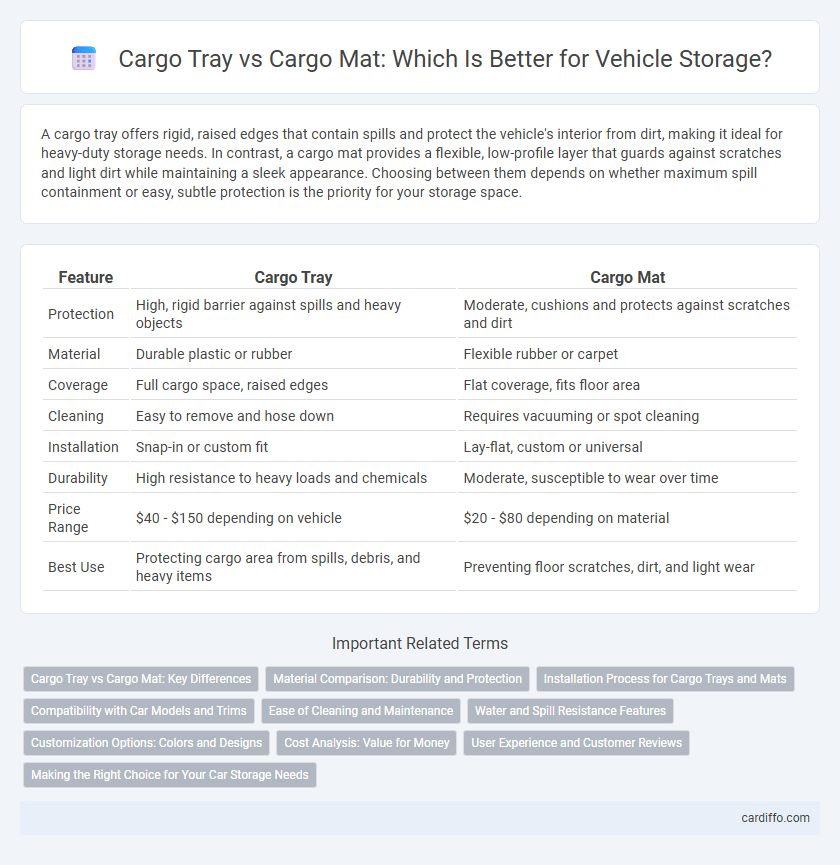A cargo tray offers rigid, raised edges that contain spills and protect the vehicle's interior from dirt, making it ideal for heavy-duty storage needs. In contrast, a cargo mat provides a flexible, low-profile layer that guards against scratches and light dirt while maintaining a sleek appearance. Choosing between them depends on whether maximum spill containment or easy, subtle protection is the priority for your storage space.
Table of Comparison
| Feature | Cargo Tray | Cargo Mat |
|---|---|---|
| Protection | High, rigid barrier against spills and heavy objects | Moderate, cushions and protects against scratches and dirt |
| Material | Durable plastic or rubber | Flexible rubber or carpet |
| Coverage | Full cargo space, raised edges | Flat coverage, fits floor area |
| Cleaning | Easy to remove and hose down | Requires vacuuming or spot cleaning |
| Installation | Snap-in or custom fit | Lay-flat, custom or universal |
| Durability | High resistance to heavy loads and chemicals | Moderate, susceptible to wear over time |
| Price Range | $40 - $150 depending on vehicle | $20 - $80 depending on material |
| Best Use | Protecting cargo area from spills, debris, and heavy items | Preventing floor scratches, dirt, and light wear |
Cargo Tray vs Cargo Mat: Key Differences
Cargo trays feature raised edges designed to contain spills and debris, offering superior protection for vehicle floors compared to cargo mats. Cargo mats provide a flat, flexible layer that guards against dirt and wear but lack the containment capabilities of trays. Choosing between cargo tray vs cargo mat depends on the level of protection needed and the specific cargo handling requirements.
Material Comparison: Durability and Protection
Cargo trays are typically made from rigid, molded plastics such as high-density polyethylene (HDPE), offering superior durability and enhanced protection against heavy impacts, spills, and sharp objects. Cargo mats, often constructed from flexible rubber or thermoplastic elastomer (TPE), provide excellent coverage and resistance to slipping but may wear down faster under extreme abrasion. The choice between a cargo tray and a cargo mat depends on the need for heavy-duty protection versus flexibility and ease of cleaning in vehicle storage areas.
Installation Process for Cargo Trays and Mats
Cargo trays typically feature rigid, molded designs that snap directly into place, allowing for a simple, tool-free installation and secure fit within vehicle cargo areas. Cargo mats, made from flexible rubber or carpet materials, usually require unrolling and placement into the cargo space, with some models equipped with adhesive backing or anti-slip pads for enhanced stability. Both options offer customizable installation tailored to specific vehicle models, ensuring protection against spills, dirt, and wear.
Compatibility with Car Models and Trims
Cargo trays are custom-molded to fit specific car models and trims precisely, offering tailored protection that aligns with the vehicle's interior contours. Cargo mats, typically made of flexible materials, provide a more universal fit, compatible with multiple car models but may lack the exact fit and edge coverage of trays. For optimal compatibility, verify the exact make, model, and trim year when selecting cargo trays, whereas cargo mats are better suited for broader applications or aftermarket use.
Ease of Cleaning and Maintenance
Cargo trays feature raised edges and rigid surfaces that prevent spills from spreading, allowing for quick, hassle-free cleaning with just a wipe or rinse. Cargo mats, typically made from softer, flexible rubber or carpet materials, may trap dirt and moisture, requiring more thorough scrubbing and drying to maintain. The durable, non-porous construction of cargo trays offers superior resistance to stains and odors, enhancing long-term maintenance efficiency compared to cargo mats.
Water and Spill Resistance Features
Cargo trays offer superior water and spill resistance due to their raised edges and durable, non-porous materials that prevent liquids from seeping onto the vehicle floor. Cargo mats provide basic protection but often lack the deep contours necessary to contain larger spills effectively. For optimal moisture control and easy cleanup, cargo trays are typically preferred in environments prone to frequent wet or messy cargo.
Customization Options: Colors and Designs
Cargo trays and cargo mats offer various customization options tailored to user preferences, with cargo trays typically featuring limited color choices centered around neutral tones for versatility. Cargo mats provide a wider array of colors and designs, enabling vehicle owners to match or enhance the interior aesthetic. Custom-fit cargo mats often come with patterns and branding options, emphasizing personalization alongside functionality.
Cost Analysis: Value for Money
Cargo trays typically offer higher durability with rigid, molded construction resistant to spills and heavy-duty use, justifying their higher initial cost. Cargo mats provide a more affordable alternative with flexible, lighter materials suited for light protection and easier removal but may wear out faster and require replacement more often. Evaluating cost per year of use, cargo trays deliver better long-term value for money through improved lifespan and enhanced protection of storage areas.
User Experience and Customer Reviews
Cargo trays offer raised edges that effectively contain spills and debris, enhancing vehicle cleanliness and ease of maintenance according to numerous user reviews. Cargo mats provide a flatter surface that fits snugly, allowing flexibility in cargo placement while offering protection against scratches and dirt. Customers frequently praise cargo trays for superior spill management, whereas cargo mats are favored for their lightweight design and ease of installation.
Making the Right Choice for Your Car Storage Needs
Choosing between a cargo tray and a cargo mat depends on your car storage needs and the level of protection required. Cargo trays offer raised edges and durable materials for heavy-duty protection against spills and dirt, making them ideal for rugged use and transport of messy items. Cargo mats provide a flexible, flat surface that covers the cargo area while offering moderate protection and easier customization options for everyday light use.
cargo tray vs cargo mat Infographic

 cardiffo.com
cardiffo.com